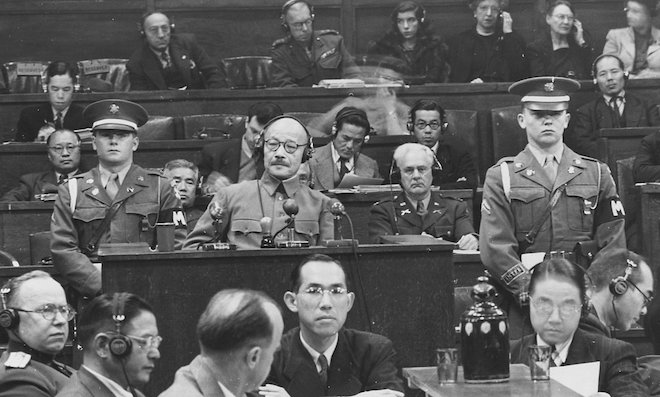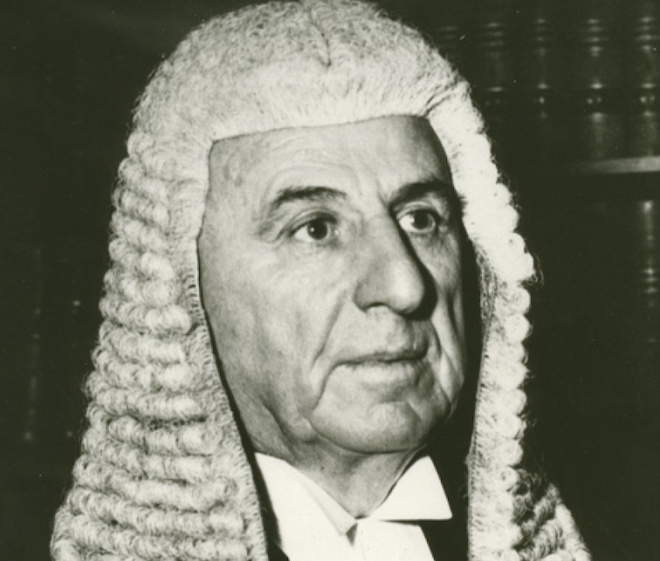Tokyo Trial
 Critics' Corner,
Critics' Corner,  Miss Lumière •
Miss Lumière •  Wednesday, June 23, 2021
Wednesday, June 23, 2021 The post WW11 tribunal that tried the Japanese leadership ... Inventing crimes after the event ... Eleven judges wrestle with the complexities over three years ... Egos muddled with legal principles ... Miss Lumière reviews the Netflix mini-series on Japanese war crimes
 Japanese Premier Hideki Tojo - executed after trial by the IMTFE
Japanese Premier Hideki Tojo - executed after trial by the IMTFE
War crimes were very much in the cold Sydney air (and in court 18D) when Miss Lumière tuned into watch Tokyo Trial, a richly dramatised account of how a panel of international jurists put alleged Japanese war criminals on trial in the immediate aftermath of World War 11.
Oh what a lovely war it's not.
Rather, Tokyo Trial succeeds in making riveting drama (and heaps of intellectual hay) from the nearly three years it took for eleven judges comprising the International Military Tribunal for the Far East (IMTFE) to determine the culpability of the Japanese leadership and their appropriate punishments.
This fascinating, sometimes harrowing four-part series was co- produced by Japan's public broadcaster NHK in collaboration with the Netherlands and Canada.
It is surprisingly good, and not just because it traverses the moral high ground as well as the political low ground.
Tokyo Trial manages to make a whole lot of legal argument interesting because it cleverly focuses on the individual characters of the judges, who hail from wildly varying jurisdictions.
Led by Australian High Court Justice Sir William Webb (a stiffly sour performance by Jonathan Hyde) the IMTFE proves to be the perfect arena for a clash of cultures and egos.
Looming largest in the ego department (aside from Supreme Commander of the Allied Powers US General Douglas MacArthur) is the Scottish judge Lord William Patrick (Paul Freeman), who sees his task as straightforward; simply follow the precedent set by the Nuremburg trials in 1946.
In the other corner is India's Radhabinod Pal (Irrfan Khan) fired with the zeal of his country's imminent independence and keen to test the boundaries of colonialism.
 High Court justice Sir William Webb, from Queensland, President of the Military Tribunal for the Far East
High Court justice Sir William Webb, from Queensland, President of the Military Tribunal for the Far East
Pal maintained that the "new" Nuremburg war crimes - of aggression, against peace and against humanity - should not be applied retrospectively and that the tribunal was driven by revenge, not justice.
In the centre is the humanist Bert Röling (an empathetic Marcel Hensema) from the Netherlands, who begins by questioning the tribunal's charter, vacillates about applying Nuremburg law and finally ends up supporting the death penalty.
Also in the middle, but clearly aligned with the US representative (Tim Ahern as a very chiselled Major General Myron C. Cramer) and UK are NZ Supreme Court Justice Sir Erima Northcroft (Julian Wadham sporting a less than convincing accent), Canadian judge Edward McDougall and French colonial jurist Henri Bernard.
China's Mei Ju-ao (David Tse) and The Philippines' Delfin Jaranilla (Bert Matias) come to the table bearing the all too fresh scars of recent Japanese invasion and brutality in their homelands.
Kestutis Jakstas gives an amusing performance as Russia's roughneck Red Army tribunal member, General Zaryanov.
It's a heady, complex mix of politics and personality, all played out against the utter destruction wreaked upon Japan by the nuclear bombing of Hiroshima and Nagasaki, surely one the greatest war crimes ever committed.
Tokyo Trial's co-directors, Pieter Verhoeff and Rob W. King make liberal use of archival footage, brilliantly melding scratchy black and white images of the actual trial with film of the actors.
While private doubts and jockeying for influence feature in many of the discussions between the judges, what is at stake is always perfectly clear; nothing less than the future of the "civilised world".
Of course we know what happened in the end: justice was seen to have been done (if one ignores the fact that Emperor Hirohito got way scot-free).
The perpetrators, both military and political, were either executed or imprisoned, the Nuremburg and Tokyo tribunals served as precursors to the International Criminal Court in The Hague, and world peace ensued ... sort of.
Tokyo Trial is streaming now on Netflix.
 Film review,
Film review,  Mini-series,
Mini-series,  War crimes
War crimes 








Reader Comments